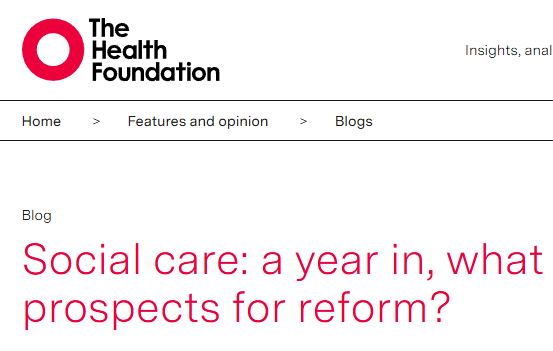Copyright talkingupscotlandtwo

Many expert commentators argue that long waits in A&E are caused – to a substantial degree – by delays in discharging hospital in-patients when medically ready for discharge and that this is caused by deficiencies on social care. It doesn’t look as if the British Labour Party government in Westminster – despite its campaigning rhetoric – will bring about reform to England’s social care sector and its financial resourcing anytime soon. The Health Foundation think tank published a blog post on October 22 entitled: ‘Social care: a year in, what prospects for reform?’ It included these statements. First for context: ‘Labour was elected on a manifesto with a headline pledge to implement England’s first Fair Pay Agreement (FPA), establish a ‘National Care Service’ and a pledge by health secretary Wes Streeting to implement a cap on social care costs and more generous means testing.’ Then this: ‘.. the timeline of policy work so far might be better described as glacial rather than transformational. It took 6 months to announce the Casey Commission. 9 months on, its modus operandi and programme remain unclear – and it will not issue its final report until 2028. What a National Care Service means in practice therefore is likely to remain hazy. Consultation on the FPA has begun but this enormous set of changes to policy, legislation and practice is unlikely to be applied to workers’ contracts before 2028. Together these timelines feel too distant for a system under acute, sustained and growing pressure. The government’s approach has an Augustinian feel – it does want to reform social care … but not yet.’ (my emphasis) ‘Then there is the money. The £4bn extra a year in 2028/29 already announced for social care in the Spending Review was better than expected given the grim fiscal context. But much of it will come out from local council taxpayers rather than Treasury coffers.’ And later: ‘Then there is implementation of the 10-Year Health Plan, where the proposed shift towards neighbourhood care will surely be impossible without adequately resourced social care.’ Doesn’t look as if the governments in Belfast, Cardiff and Edinburgh operating with only devolved powers are going to get much financial assistance from Westminster any time soon to enable much needed reform of social care – unless of course these devolved governments ‘rob Peter to pay Paul’ in their budget allocations. How well is Scotland doing with regard to care in the community? See



